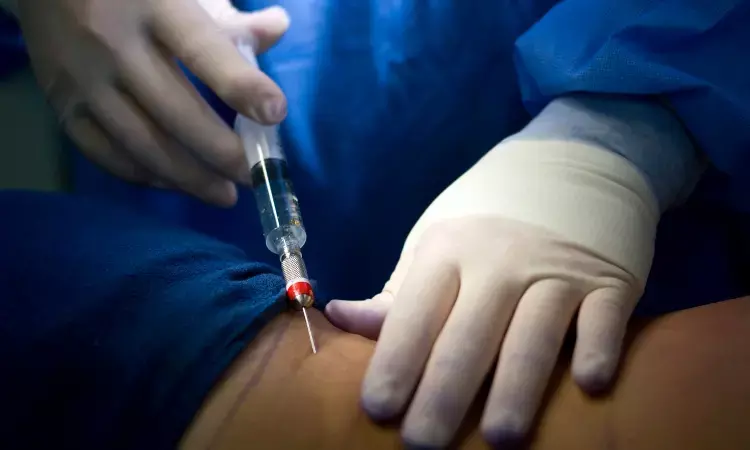- Home
- Medical news & Guidelines
- Anesthesiology
- Cardiology and CTVS
- Critical Care
- Dentistry
- Dermatology
- Diabetes and Endocrinology
- ENT
- Gastroenterology
- Medicine
- Nephrology
- Neurology
- Obstretics-Gynaecology
- Oncology
- Ophthalmology
- Orthopaedics
- Pediatrics-Neonatology
- Psychiatry
- Pulmonology
- Radiology
- Surgery
- Urology
- Laboratory Medicine
- Diet
- Nursing
- Paramedical
- Physiotherapy
- Health news
- Fact Check
- Bone Health Fact Check
- Brain Health Fact Check
- Cancer Related Fact Check
- Child Care Fact Check
- Dental and oral health fact check
- Diabetes and metabolic health fact check
- Diet and Nutrition Fact Check
- Eye and ENT Care Fact Check
- Fitness fact check
- Gut health fact check
- Heart health fact check
- Kidney health fact check
- Medical education fact check
- Men's health fact check
- Respiratory fact check
- Skin and hair care fact check
- Vaccine and Immunization fact check
- Women's health fact check
- AYUSH
- State News
- Andaman and Nicobar Islands
- Andhra Pradesh
- Arunachal Pradesh
- Assam
- Bihar
- Chandigarh
- Chattisgarh
- Dadra and Nagar Haveli
- Daman and Diu
- Delhi
- Goa
- Gujarat
- Haryana
- Himachal Pradesh
- Jammu & Kashmir
- Jharkhand
- Karnataka
- Kerala
- Ladakh
- Lakshadweep
- Madhya Pradesh
- Maharashtra
- Manipur
- Meghalaya
- Mizoram
- Nagaland
- Odisha
- Puducherry
- Punjab
- Rajasthan
- Sikkim
- Tamil Nadu
- Telangana
- Tripura
- Uttar Pradesh
- Uttrakhand
- West Bengal
- Medical Education
- Industry
Intraoperative intercostal nerve block provides quick postoperative analgesia, finds study

In the realm of thoracic surgery, video-assisted thoracoscopic surgery (VATS) has supplanted thoracotomy because VATS reduces postoperative discomfort more effectively than thoracotomy. A number of surgeons have recently proved that a VATS can be performed using a single incision. Compared to multiport VATS, uniport VATS has shown positive results to far. Nevertheless, postoperative discomfort remains the primary issue for thoracic procedures. A recently published research assessed the effect of intraoperative intercostal nerve block on the postoperative discomfort of patients receiving uniportal VATS, particularly wedge resection, with intraoperative intercostal nerve block.
All patients who had uniportal VATS wedge resection between January 2019 and March 2020 were retrospectively evaluated. Twenty patients in Group A had uniportal VATS wedge resection without intraoperative intercostal nerve block. Twenty more consecutive Group B patients had uniportal VATS wedge resection with intraoperative intercostal nerve block. Postoperatively, the numeric pain rating scale (NRS) values were measured at 1, 12, and 24 hours. In addition, the number of opioids used up to the moment of chest tube removal was noted. There were no significant differences between groups for sex, age, chest tube duration, length of stay, surgical time, laterality time, or diagnosis. Postoperative NRS scores were significantly different across groups at 1 h (P = 0.001) and 12 h (P = 0.022). In Group B, opioid usage was considerably lower than in Group A (P = 0.025).
The intraoperative intercostal nerve block with bupivacaine offered rapid postoperative pain relief and decreased postoperative opioid intake in comparison to patients who received uniportal VATS, particularly wedge resection of the lung. The precision of the intraoperative intercostal nerve block is a benefit. Under direct observation, local anaesthetic injections are administered, and a parietal pleural bulge is seen across the intercostal area. In this research, injections were administered at different levels, from the third to the seventh intercostal space, to reduce the discomfort produced by the uniport performed through the fifth intercostal space.
Reference –
Kang DK, Kang MK. A pilot study of intraoperative intercostal nerve block during uniportal thoracoscopic wedge resection of the lung. Ann Thorac Med 2022;17:180-3.
MBBS, MD (Anaesthesiology), FNB (Cardiac Anaesthesiology)
Dr Monish Raut is a practicing Cardiac Anesthesiologist. He completed his MBBS at Government Medical College, Nagpur, and pursued his MD in Anesthesiology at BJ Medical College, Pune. Further specializing in Cardiac Anesthesiology, Dr Raut earned his FNB in Cardiac Anesthesiology from Sir Ganga Ram Hospital, Delhi.
Dr Kamal Kant Kohli-MBBS, DTCD- a chest specialist with more than 30 years of practice and a flair for writing clinical articles, Dr Kamal Kant Kohli joined Medical Dialogues as a Chief Editor of Medical News. Besides writing articles, as an editor, he proofreads and verifies all the medical content published on Medical Dialogues including those coming from journals, studies,medical conferences,guidelines etc. Email: drkohli@medicaldialogues.in. Contact no. 011-43720751


